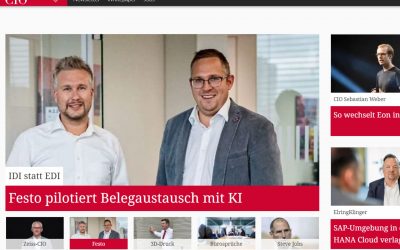Introducing IDI – Intelligent Data Interchange

In a world that is getting smarter, it is time for “next level EDI”
WHY A 50-YEAR-OLD TECHNOLOGY IS NO LONGER SUFFICIENT TO BE COMPETITIVE TODAY.
Thousands of companies and with them millions of clerks in purchasing, logistics, sales and accounting find themselves caught in the daily hamster wheel of repetitive manual processing of documents. And there is no end in sight. At the same time, the world is becoming increasingly intelligent, and people are no longer just working together electronically. Rather, their environment and the systems they use are getting smarter. We are clearly experiencing the advent of AI (artificial intelligence) in the private sphere. In the professional ERP (Enterprise Resource Planning) context, however, we are still driving with at least one foot on the break. Complex existing systems in companies cannot be trimmed for AI on such short notice.
BUT THE CHALLENGES ARE PILING UP:
The previous monotonous way of working in document processing will no longer be accepted by a future workforce.
New user-friendly and intuitive tools with a corresponding user experience will become self-evident.
Increasing shortages of skilled workers will make lengthy IT projects impossible in the future.
The pure “administration” of data by the user has become uninteresting and expensive. A more intelligent way of working based on system feedback is needed.
Connections and networking must be “seamless” and have to work via „plug-and-play“.
Correcting data syntactically is no longer enough. Content must be intelligently enriched based on data sources and knowledge.
“WE’VE ALWAYS DONE IT THIS WAY” VS. ARTIFICIAL INTELLIGENCE
Due to these circumstances, new and intelligent systems are emerging as a logical consequence that look at and solve these problems differently. All of them have an innovative approach, which we call IDI – Intelligent Data Interchange. As H&F Solutions GmbH we develop and market such a system to automate document exchange in an intelligent way.
WHY IS IT TIME TO TAKE EDI TO THE NEXT LEVEL?
Business relationships have always required the exchange of information e.g., through purchase orders, order confirmations and invoices etc. Until the end of the 1960s, this was done in the form of paper documents. These were processed by hand. In the early 1970s, EDI (Electronic Data Interchange) was introduced to exchange business data electronically, thus reducing manual processing and making business processes more efficient. Over the next decades and with the further development of ERP systems and cross-system standards, EDI became increasingly important and is still widely accepted in various industries today. Standardization became the motto in this development over the years. Today, most companies use individualized interfaces between ERP systems such as SAP to optimize their business processes and make their supply chains more efficient.

The reality check
DOCUMENT PROCESSING COSTS A LOT OF MONEY AND TIME
Even with the implementation of EDI, only 5 % of all documents in companies today are processed fully automatically . 95 % have to be manually reprocessed in ERP systems at one point or another. On average, this costs 15 minutes of time per document. Every year, 1.2 trillion documents are exchanged between companies worldwide, resulting in almost 300 billion working hours for clerks during this period.
EDI IMPLEMENTATION IS COMPLEX
EDI projects can be time-consuming and costly to implement. They often take months or even years and result in only a single bilateral interface, rather than providing true connectivity. This is especially challenging for smaller companies that may not have the resources or expertise to set up and maintain EDI interfaces. And large companies often only connect their most important partners for cost reasons. As a result, only a fraction of the potential inherent in integrations can usually be realized, and any changes on the partners side usually lead to surprising changes on their own side.
LACK OF STANDARDS
Although standardized EDI formats exist, all attempts to transfer these standards to the broad mass of users have failed so far. As a result, many companies still use their own proprietary EDI systems or work with formats and interfaces that are very flexible in their individual design. Although this can be a short-term solution, it makes sustainable use more difficult. This is because it requires extensive technical connections, transformations, and the use of expensive tools, and makes interoperability between different business partners difficult.
LOW FLEXIBILITY
EDI is most effective when it comes to recurring business processes in which documents are exchanged in predefined formats. It becomes difficult however, when complex, unstructured or frequently changing data needs to be processed. Often, process gaps and/or a one-sided interest of the parties involved also result in poor data quality or incomplete data. This in turn creates further process-related challenges.
LACK OF SUPPORT FROM ERP SYSTEMS
In addition, ERP systems provide only little support for the user at the interface between the systems and in relation to the document data. And if there is any support, it is provided only through interfaces which are difficult to operate. Areas like the targeted improvement of data, querying of data gaps or comparison of document data are not being paid attention.
DEMOTIVATING ACTIVITY
As a clerk, performing repetitive and mindless tasks daily is not something that excites or motivates. As a result, the workplace is perceived as unattractive. Since the job often involves fixing error-ridden data, the work environment is viewed primarily as a problem-solving environment. If intuitive user interfaces or user-friendly functions are on the essentials, and instead are wasting missing, employees are simply unable to concentrate on the essentials wasting valuable time learning complex programs. Motivation and enjoyment at wordk dwindle and productivity is severely lost. And so is any productivity.
SHORTAGE OF SKILLED WORKERS
Skilled professionals are looking for companies that provide them with modern tools to develop their skills and reach their full potential. A company that does not have up-to-date software equipment is at a distinct disadvantage when it comes to attracting and retaining talent.
SOCIETAL IMPACT
Faulty and disrupted supply chains lead to societal challenges, which came to the fore in recent times of crisis during Corona. To act preventively and harden supply chains, information flows between companies must not only be improved, but extensively rebuilt. Additionally to the usual project runtimes of several months and the technical challenges of the necessary interfaces, companies face an unmanageable organizational challenge. Necessary information on delays and stock levels is not only available in one system, but in several, and not only within the company itself, but distributed to companies that are sometimes several business relationships away. Where do you start?
Current solutions on the market have different approaches, but do not cover all challenges.
Welcome to the world of IDI
OUR CLOUD SOLUTION AUTOMATES ABOUT 95% OF DOCUMENT PROCESSING THROUGH “INTELLIGENCE”
Intelligent systems solve traditional problems differently. The IDI – Intelligent Data Interchange approach enables us to revolutionize document exchange. Our application currently automates 85 percent, soon to be 95 percent, of document exchange using a radical new approach. While EDI (Electronic Data Interchange) still tries to squeeze data into a standardized format, IDI takes a smarter approach. It fills data gaps, contextualizes information, and uses machine learning. Thanks to AI, our system initially understands the context of each piece of information. In the next step, it can then assign it in an automated way to the correct recipient.

IDI FUNDAMENTALLY CHANGES THE CORPORATE WORLD
Clerks no longer waste their time in SAP/ERP input masks but can finally work productively and take care of supplier and customer needs instead of documents and numbers.
Thanks to our 100% SaaS application, our users can connect new business partners and open new sales channels much easier, faster, and cheaper. This can radically accelerate revenue growth and open new strategic options for scaling.
Overburdened IT departments are often the cause when new business and thus new interfaces cannot be realized quickly enough. Our application also solves this problem through IDI by allowing data to flow between companies in an automated way. We solve the complexity within the invisible depths of the IT stack, curing a constant pain point of the “bottleneck IT”, for which up to this date there had been no technical solution. IT teams no longer have to deal with business partner connectivity processes that take months or years to complete. They can devote themselves to significantly more productive and future-oriented projects and thus move from being a bottleneck to being an engine for scaling.
Compact and reliable data formats are also much more ecological and easier to track for comprehensive supply chain visibility. This is also becoming increasingly important for audits required by law.
Summary
Intelligent systems will change the world of work and workplaces. Plug-and-play connectivity will replace lengthy connectivity projects, allowing data to be processed in an automated and scalable way. So, innovating the node of data networking between companies is up to you: If you start to automate intelligently today, you raise a potential that has been hidden for over 50 years. The all-important question is simply: “Are you in the game of intelligent networking with IDI?
#idi #edi #nextlevelEDI




